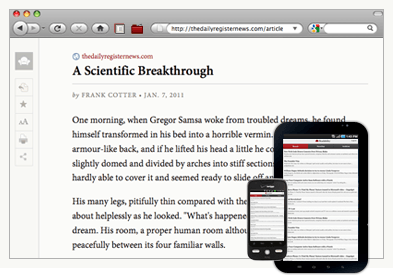The broad application of Apple’s new App Store subscription guidelines to everything from magazines (sensible) to Kindle books (questionable) to Readability (delusional) to Tiny Grab and possibly DropBox (downright silly) could end up being the single-worst business decision the Cupertino Colossus has made in the last decade, for one very simple reason: it seeks to maximize App Store revenue at the expense of making iPhones and iPads the most attractive hardware platforms on the market. Getting 30% of Readability’s revenue cannot possibly justify the risk of making the iPad sell a few hundred thousand fewer units.
Apple really needs to take a step back and redo these guidelines.
First, remove the restriction preventing apps from directing users to a web page to make their purchases. It simply is not possible that the lost revenue from those sales is equivalent or better than the value of having the best possible content library available on iOS.
Second, apply the revenue split only to subscription applications intended strictly for iOS. Charge that fee as it applies to magazines and publications designed for the platform and leave things like Kindle, Netflix and Dropbox out of the equation. Since Apple won’t be footing the bandwidth to deliver the content for such subscriptions, there is no possible justification for taking a cut of the revenue from them other than greed.
Third, remember what business you’re in. The entire purpose of the App Store and iTunes is to make Apple’s hardware more attractive to users. It’s not actually to enforce hardware lock-in, it’s to create a platform that is so superior in its capabilities, content, and experience that the costs of switching are too great for people to contemplate. If you drive away the content and tools they use on all sorts of other platforms, you’ll ultimately make Android and Windows Phone 7 actually start to seem like more reasonable choices. To date, Apple has only sold 10 billion songs and change. Of that, Apple cleared no more than $3 billion in revenue, and probably no more than $1 billion in profit. That’s all nice, but it represents seven years of sales so far. Last quarter, the iPad generated well over a billion in profit by itself. Apps are there to increase the latter number, not try to turn app sales into a meaningful business.
I continue to watch in horror as ever-more respected apps announce that they have run afoul of the new guidelines. This is a dumb decision on Apple’s part, and there are no excuses that make it sensible, as the increasingly desperate rationale of John Gruber has shown. Tim Cook should show some leadership here and write an open letter explaining how much more narrowly the rules will be applied from here on out. Anything else hurts the long-term potential of the platform I love. Remember: Just because you could get money from every transaction associated with your platform doesn’t mean that you should. Some charges just make you into a jerk.


